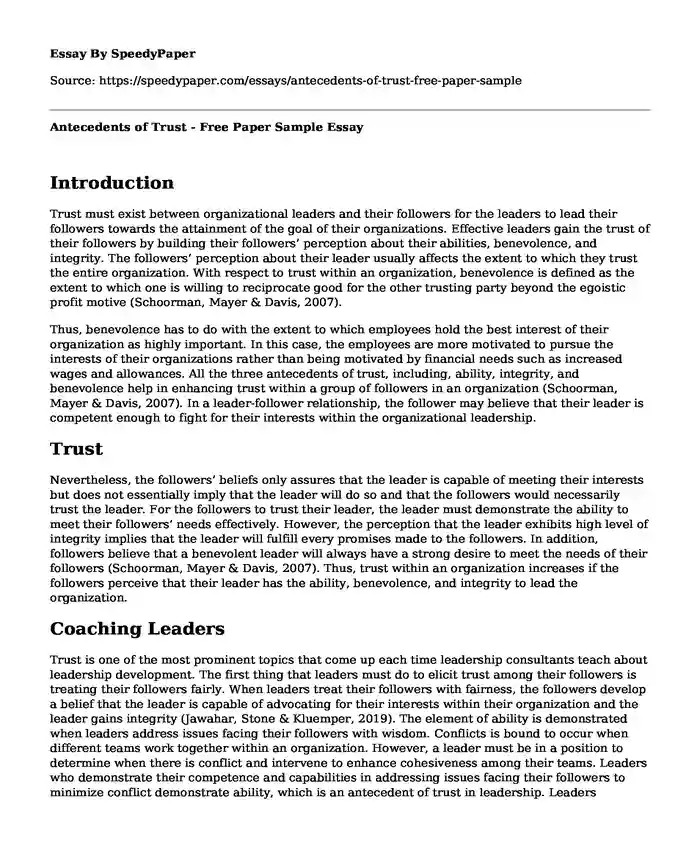
| Type of paper: | Essay |
| Categories: | Organizational behavior Leadership management |
| Pages: | 3 |
| Wordcount: | 631 words |
Introduction
Trust must exist between organizational leaders and their followers for the leaders to lead their followers towards the attainment of the goal of their organizations. Effective leaders gain the trust of their followers by building their followers’ perception about their abilities, benevolence, and integrity. The followers’ perception about their leader usually affects the extent to which they trust the entire organization. With respect to trust within an organization, benevolence is defined as the extent to which one is willing to reciprocate good for the other trusting party beyond the egoistic profit motive (Schoorman, Mayer & Davis, 2007).
Thus, benevolence has to do with the extent to which employees hold the best interest of their organization as highly important. In this case, the employees are more motivated to pursue the interests of their organizations rather than being motivated by financial needs such as increased wages and allowances. All the three antecedents of trust, including, ability, integrity, and benevolence help in enhancing trust within a group of followers in an organization (Schoorman, Mayer & Davis, 2007). In a leader-follower relationship, the follower may believe that their leader is competent enough to fight for their interests within the organizational leadership.
Trust
Nevertheless, the followers’ beliefs only assures that the leader is capable of meeting their interests but does not essentially imply that the leader will do so and that the followers would necessarily trust the leader. For the followers to trust their leader, the leader must demonstrate the ability to meet their followers’ needs effectively. However, the perception that the leader exhibits high level of integrity implies that the leader will fulfill every promises made to the followers. In addition, followers believe that a benevolent leader will always have a strong desire to meet the needs of their followers (Schoorman, Mayer & Davis, 2007). Thus, trust within an organization increases if the followers perceive that their leader has the ability, benevolence, and integrity to lead the organization.
Coaching Leaders
Trust is one of the most prominent topics that come up each time leadership consultants teach about leadership development. The first thing that leaders must do to elicit trust among their followers is treating their followers fairly. When leaders treat their followers with fairness, the followers develop a belief that the leader is capable of advocating for their interests within their organization and the leader gains integrity (Jawahar, Stone & Kluemper, 2019). The element of ability is demonstrated when leaders address issues facing their followers with wisdom. Conflicts is bound to occur when different teams work together within an organization. However, a leader must be in a position to determine when there is conflict and intervene to enhance cohesiveness among their teams. Leaders who demonstrate their competence and capabilities in addressing issues facing their followers to minimize conflict demonstrate ability, which is an antecedent of trust in leadership. Leaders demonstrate integrity when they become truthful and fulfill what they promise to their followers (Sendjaya & Pekerti, 2010).
Conclusion
Therefore, leaders must be coached on how to develop respectful and truthful relationships with their followers. The strategies for coaching leaders differs under different context, such as for-profit and nonprofit organizations. In for-profit organizations, leaders are coached on how to motivate their employees beyond the financial incentives while in nonprofit organizations, leaders are coached on how to motivate their followers to develop a strong value for nonfinancial benefits and values.
References
Jawahar, I. M., Stone, T. H., & Kluemper, D. (2019). When and why leaders trust followers. Career Development International. doi.org/10.1108/cdi-03-2019-0078
Schoorman, F. D., Mayer, R. C., & Davis, J. H. (2007). An integrative model of organizational trust: Past, present, and future. The Academy of Management Review, 32(2), 344–354. doi.org/10.2307/20159304
Sendjaya, S., & Pekerti, A. (2010). Servant leadership as antecedent of trust in organizations. Leadership & Organization Development Journal. doi.org/10.1108/01437731011079673.
Cite this page
Antecedents of Trust - Free Paper Sample. (2023, Nov 25). Retrieved from https://speedypaper.com/essays/antecedents-of-trust-free-paper-sample
Request Removal
If you are the original author of this essay and no longer wish to have it published on the SpeedyPaper website, please click below to request its removal:
- Free Essay on Credit Management and Its Financial Implication on the Business
- Gross Income: Concepts and Inclusions Summary, Free Essay for Students
- Free Essay: How Technological, Philosophical and Operational Innovation Can Realign the Practice of Procurement
- Free Essay - Leadership Change Analysis
- Essay Sample on An HR Podcast, "Covid-19"
- Essay Sample on Risks and Decision Making
- Paper Sample on Intel's Ethical Challenge: Addressing Human Rights Concerns in the Coltan Supply Chain
Popular categories




